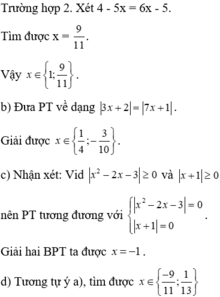1Giải các phương trình sau bằng cách đưa về phương trình tích:
a) 3x(2x – 3) = 5(3 – 2x)
b) (x2 + 1)(2x + 5) = (x – 1)(x2 + 1)
c) 3x3 = x2 + 3x - 1
d) x2 – 9x + 20 = 0
2Giải các phương trình sau bằng cách đưa về phương trình tích:
a) 3x(2x – 3) = 5(3 – 2x)
b) (x2 + 1)(2x + 5) = (x – 1)(x2 + 1)
c) 3x3 = x2 + 3x - 1
d) x2 – 9x + 20 = 0
Hãy nhập câu hỏi của bạn vào đây, nếu là tài khoản VIP, bạn sẽ được ưu tiên trả lời.

bạn đăng tách cho mn cùng giúp nhé
Bài 1 :
a, \(\Leftrightarrow11-x=12-8x\Leftrightarrow7x=1\Leftrightarrow x=\dfrac{1}{7}\)
b, \(\Leftrightarrow2x\left(x^2+4x+4\right)-8x^2=2\left(x^3-8\right)\)
\(\Leftrightarrow2x^3+8x^2+8x-8x^2=2x^3-16\Leftrightarrow x=-2\)
c, \(\Leftrightarrow3-2x=-x-4\Leftrightarrow x=7\)
d, \(\Leftrightarrow x^3-6x^2+12x-8+9x^2-1=x^3+3x^2+3x+1\)
\(\Leftrightarrow3x^2+12x-9=3x^2+3x+1\Leftrightarrow x=\dfrac{10}{9}\)
e, \(\Leftrightarrow2x^2-x-3=2x^2+9x-5\Leftrightarrow x=5\)
f, \(\Leftrightarrow x^3-3x^2+3x-1-x^3-2x^2-x=10x-5x^2-11x-22\)
\(\Leftrightarrow-5x^2+2x-1=-5x^2-x-22\Leftrightarrow3x=-21\Leftrightarrow x=-7\)

\(a,x^2-10x=-25\)
\(< =>x^2-10x+25=0\)
\(< =>\left(x-5\right)^2=0< =>x=5\)
b, \(4x^2-4x=-1\)
\(< =>4x^2-4x+1=0\)
\(< =>\left(2x-1\right)^2=0< =>x=\frac{1}{2}\)

a) 3 x 2 − 7 x − 10 ⋅ 2 x 2 + ( 1 − 5 ) x + 5 − 3 = 0

+ Giải (1):
3 x 2 – 7 x – 10 = 0
Có a = 3; b = -7; c = -10
⇒ a – b + c = 0
⇒ (1) có hai nghiệm x 1 = - 1 v à x 2 = - c / a = 10 / 3 .
+ Giải (2):
2 x 2 + ( 1 - √ 5 ) x + √ 5 - 3 = 0
Có a = 2; b = 1 - √5; c = √5 - 3
⇒ a + b + c = 0
⇒ (2) có hai nghiệm:

Vậy phương trình có tập nghiệm 
b)
x 3 + 3 x 2 - 2 x - 6 = 0 ⇔ x 3 + 3 x 2 - ( 2 x + 6 ) = 0 ⇔ x 2 ( x + 3 ) - 2 ( x + 3 ) = 0 ⇔ x 2 - 2 ( x + 3 ) = 0

+ Giải (1): x 2 – 2 = 0 ⇔ x 2 = 2 ⇔ x = √2 hoặc x = -√2.
+ Giải (2): x + 3 = 0 ⇔ x = -3.
Vậy phương trình có tập nghiệm S = {-3; -√2; √2}
c)
x 2 − 1 ( 0 , 6 x + 1 ) = 0 , 6 x 2 + x ⇔ x 2 − 1 ( 0 , 6 x + 1 ) = x ⋅ ( 0 , 6 x + 1 ) ⇔ x 2 − 1 ( 0 , 6 x + 1 ) − x ( 0 , 6 x + 1 ) = 0 ⇔ ( 0 , 6 x + 1 ) x 2 − 1 − x = 0

+ Giải (1): 0,6x + 1 = 0 ⇔ 
+ Giải (2):
x 2 – x – 1 = 0
Có a = 1; b = -1; c = -1
⇒ Δ = ( - 1 ) 2 – 4 . 1 . ( - 1 ) = 5 > 0
⇒ (2) có hai nghiệm 
Vậy phương trình có tập nghiệm 
d)
x 2 + 2 x − 5 2 = x 2 − x + 5 2 ⇔ x 2 + 2 x − 5 2 − x 2 − x + 5 2 = 0 ⇔ x 2 + 2 x − 5 − x 2 − x + 5 ⋅ x 2 + 2 x − 5 + x 2 − x + 5 = 0 ⇔ ( 3 x − 10 ) 2 x 2 + x = 0
⇔ (3x-10).x.(2x+1)=0


+ Giải (1): 3x – 10 = 0 ⇔ 
+ Giải (2):


6:
k: =>x^2-9<x^2+2x+3
=>2x+3>-9
=>2x>-12
=>x>-6
1:
h: =>x(x-1)=0
=>x=0; x=1
i: =>x(x-3)=0
=>x=0; x=3

a: (3x-2)(4x+5)=0
=>3x-2=0 hoặc 4x+5=0
=>x=2/3 hoặc x=-5/4
b: (2,3x-6,9)(0,1x+2)=0
=>2,3x-6,9=0 hoặc 0,1x+2=0
=>x=3 hoặc x=-20
c: =>(x-3)(2x+5)=0
=>x-3=0 hoặc 2x+5=0
=>x=3 hoặc x=-5/2

\(a,2x\left(x-5\right)+4\left(x-5\right)=0\\ \Leftrightarrow\left(x-5\right)\left(2x+4\right)=0\\ \Leftrightarrow\left[{}\begin{matrix}x-5=0\\2x+4=0\end{matrix}\right.\\ \Leftrightarrow\left[{}\begin{matrix}x=5\\2x=-4\end{matrix}\right.\\ \Leftrightarrow\left[{}\begin{matrix}x=5\\x=-2\end{matrix}\right.\)
Vậy \(x\in\left\{5;-2\right\}\)
\(b,3x-15=2x\left(x-5\right)\\ \Leftrightarrow3\left(x-5\right)-2x\left(x-5\right)=0\\ \Leftrightarrow\left(x-5\right)\left(-2x+3\right)=0\\ \Leftrightarrow\left[{}\begin{matrix}x-5=0\\-2x+3=0\end{matrix}\right.\\ \Leftrightarrow\left[{}\begin{matrix}x=5\\2x=3\end{matrix}\right.\\ \Leftrightarrow\left[{}\begin{matrix}x=5\\x=\dfrac{3}{2}\end{matrix}\right.\)
Vậy \(x\in\left\{5;\dfrac{3}{2}\right\}\)
\(c,\left(2x+1\right)\left(3x-2\right)=\left(5x-8\right)\left(2x+1\right)\\ \Leftrightarrow\left(2x+1\right)\left(3x-2\right)-\left(5x-8\right)\left(2x+1\right)=0\\ \Leftrightarrow\left(2x+1\right)\left(3x-2-5x+8\right)=0\\ \Leftrightarrow\left(2x+1\right)\left(-2x+6\right)=0\\ \Leftrightarrow\left[{}\begin{matrix}2x+1=0\\-2x+6=0\end{matrix}\right.\\ \Leftrightarrow\left[{}\begin{matrix}2x=-1\\2x=6\end{matrix}\right.\\ \Leftrightarrow\left[{}\begin{matrix}x=-\dfrac{1}{2}\\x=3\end{matrix}\right.\)
Vậy \(x\in\left\{-\dfrac{1}{2};3\right\}\)
Câu d xem lại đề


 m)
m)
a/ \(3x(2x-3)=5(3-2x) \Leftrightarrow 3x(2x-3)+5(2x-3)=0 \\\ \Leftrightarrow (2x-3)(3x+5)=0 \)
\(\Leftrightarrow\left[{}\begin{matrix}2x-3=0\\3x+5=0\end{matrix}\right.\Leftrightarrow\left[{}\begin{matrix}x=\frac{3}{2}\\x=-\frac{5}{3}\end{matrix}\right.\)
KL: .............
b/ \(\left(x^2+1\right)\left(2x+5\right)=\left(x-1\right)\left(x^2+1\right)\Leftrightarrow\left(x^2+1\right)\left(2x+5\right)-\left(x-1\right)\left(x^2+1\right)=0\)
\(\Leftrightarrow\left(x^2+1\right)\left(2x+5-x+1\right)=0\Leftrightarrow\left[{}\begin{matrix}x^2+1=0\\x+6=0\end{matrix}\right.\)\(\Leftrightarrow\left[{}\begin{matrix}x\in\varnothing\\x=-6\end{matrix}\right.\)
KL: .............
c/ \(3x^3=x^2+3x-1\Leftrightarrow3x^3-x^2-3x+1=0\Leftrightarrow x^2\left(3x-1\right)-\left(3x-1\right)=0\)
\(\Leftrightarrow\left(3x-1\right)\left(x^2-1\right)=0\Leftrightarrow\left[{}\begin{matrix}3x-1=0\\x^2-1=0\end{matrix}\right.\Leftrightarrow\left[{}\begin{matrix}x=\frac{1}{3}\\x=1\\x=-1\end{matrix}\right.\)
KL: ..........
d/ \(x^2-9x+20=0\Leftrightarrow x^2-5x-4x+20=0\Leftrightarrow x\left(x-5\right)-4\left(x-5\right)=0\)
\(\Leftrightarrow\left(x-5\right)\left(x-4\right)=0\Leftrightarrow\left[{}\begin{matrix}x-5=0\\x-4=0\end{matrix}\right.\Leftrightarrow\left[{}\begin{matrix}x=5\\x=4\end{matrix}\right.\)
KL: .............